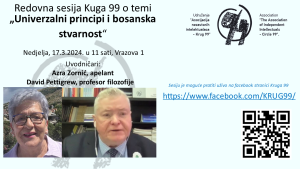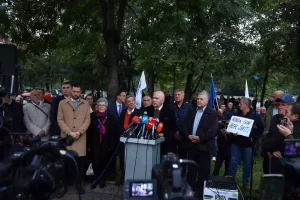AN APPROPRIATE RESPONSE TO A COUP AGAINST THE STATE

| Krug 99 (Circle 99), Sarajevo, Bosna and Herzegovina 14 July 2023 – 37 AN APPROPRIATE RESPONSE TO A COUP AGAINST THE STATE A decision to reject the authority of the Constitutional Court of Bosnia and Herzegovina, to reject the publication and implementation of decisions by the High Representative in the Republika Srpska entity and the announcement of other actions aimed at the institutional dismantling of the state in the field of security, including even a referendum on independence – all of this undoubtedly represents the systematic carrying out of a coup against the state with the purpose of dividing and destroying Bosnia and Herzegovina. Those who are currently engaged in these activities against the state must be immediately stopped. One can see in all of this a continuation of the key strategies of Slobodan Milosevic, Franjo Tudjman, Radovan Karadzic, Mate Boban and nowadays Milorad Dodik and others engaged in the division and destruction of Bosnia and Herzegovina. All of this started some 30 years ago with a strike against the legal and legitimate constitutional order of that time. An attempt was made to delegitimize the Constitution of the Republic of Bosnia and Herzegovina by forming para-states: Serbian and Croatian autonomous districts, that is the so-called Serbian Republic of Bosnia and Herzegovina and the Croatian Republic of Herzeg-Bosna. This led to bloody warfare, joint criminal enterprises and genocide, which were all later condemned, but which at the time were fostered by Serbia and Croatia. A convincing majority of citizens voted in a democratic referendum under the auspices of the European Union for a “sovereign independent Bosnia and Herzegovina, a state of citizens with equal rights.” But this was forcibly merged with the concept of the so-called “Livno issue,” which was not voted on but which called for a Bosnia and Herzegovina as “a state community of constituent and sovereign national groups … within their national areas (cantons).” The absurdity is that this is the very political and strategic basis for some domestic and international players as they attempt to hinder Bosnia and Herzegovina’s transition into the community of free and democratic countries. It has been some 30 years since the signing of the Dayton Peace Agreement, which placed our state under a Constitution signed and sealed in the throes of a genocidal war. No one expected that an agreement such as this, which succeeded in achieving peace but without a democratic transition and without the establishment of functional institutions of the state of Bosnia and Herzegovina, would endure as long as it has. During the post-Dayton period, those same forces that committed aggression against Bosnia and Herzegovina continued to pursue their wartime aims but through political, institutional and non-institutional means. That is the main reason behind the paralysis of the institutions of Bosnia and Herzegovina, which do not have the subjective capacity to react against the current dismantling of the state. In the absence of effective energetic measures, the entire security situation in the country and in the region is endangered. Institutional paralysis is the result of a misguided process and reform effort in Bosnia and Herzegovina for the most part led by the international community. In Bosnia and Herzegovina there is something called “Serbian politics,” as it so defines itself, the interest of which is separating the Republika Srpska entity from Bosnia and Herzegovina. It is aimed at weakening Bosnia and Herzegovina and making its entity more of an independent state with full state prerogatives. It follows this policy through Republika Srpska institutions and in some measure through Bosnian institutions. There is also “Croatian politics,” supported by a non-governmental organization, the Croatian National Assembly, which operates on the foundations of Herzeg-Bosna, an entity that was condemned at the Hague Tribunal as a joint criminal enterprise. Those two “politics” have completely overwhelmed the institutional system of Bosnia and Herzegovina by rejecting proportionality and imposing the unconstitutional principle of ethnic parity in representational and decision-making processes in the country. Because of this, all principal segments and sectors of the functioning of the state are paralyzed. The activity of key institutions in the country, such as security agencies, judicial institutions, tax and economic authorities, are all under the control of these “politics,” which are poised against the state. Our armed forces are structured in such a way that they are unable to take any actions, or very few actions, while Milorad Dodik insists on the demilitarization of Bosnia and Herzegovina and rejects integration of Bosnia into NATO. We are aware that under these circumstances a country that does not have adequate defensive capabilities can be in great danger and can be easily attacked. The situation is identical in the fields of security, law enforcement and the judicial system, where Milorad Dodik’s closest ally and until recently the leader of the country’s judiciary Milan Tegeltija installed persons who are not in favor of preserving Bosnia’s judicial system. This coup against the state is not a one-time effort, but rather is cumulative and time-consuming. The danger of another outbreak of hostilities and a continuation of another phase of genocide is all the greater. Denigrating the commemoration on July 11 of the 28th anniversary of the Srebrenica genocide, which some on that day actually ‘celebrated,’ is warning enough. For this reason, the policy of concessions by the U.S. Administration is misguided, as it is articulated by its Special Envoy for the Western Balkans Gabriel Escobar, who stated that the U.S. would “cooperate with (Dodik) in order to move Bosnia further along the path to Europe.” Asked whether Dodik had already violated the Dayton agreement, Escobar replied that we are witnessing a “dismantling of central institutions” and that Dodik “wants to take Republika Srpska out of the Dayton agreement, which will have consequences.” We heard a similar mantra from High Representative Christian Schmidt to the effect that he would respond to further escalations with warnings. These are nothing less than capitulations of the values that President Biden has in the past represented. For this reason, firstly, state institutions must demonstrate decisiveness, as should all political players, individuals in institutions, the public, the academic community, organizations of civic society and every citizen in every conceivable place. Under no conditions and under no circumstances should they abdicate the rights they have attained to a homeland and a free Bosnian state. Capitulation of the state is not an option. Second, in these circumstances the emergence of state political and societal forces should assemble around a platform of patriotism, functional institutions and activities in harmony with the interests of all citizens with equal rights. Third, Milorad Dodik and his allied political groups need to be energetically and efficiently prosecuted by state institutions, the judiciary and the courts for destroying the Constitutional Court and the democratic order. This should be done in order to prevent the further destabilization of institutions and the entire legal establishment. Fourth, international players need to act in a specific and timely manner to fulfill their stated principles. A key demonstration of the real intentions of the international community and its final objectives toward the Bosnian state would be the deployment of NATO troops to the Brcko district and of EUFOR to strategic points on the borders with Serbia and Croatia, as well as the removal of Dodik and his principle supporters. Fifth, in the current circumstances urgent operational measures should be undertaken to organize the population into civil defense units and other types of self-defense for possible action in any eventual extraordinary situations. ** Summary of Session of 9 July 2023, Semir Efendic, President of the “Party for Bosnia and Herzegovina” (“Stranka za Bosnu i Hercegovinu”) Adil Kulenović, President |
| Association of Independent Intellectuals – Circle 99 (Bosnian: Krug 99), a leading Bosnian think-tank, was established in Sarajevo in 1993, in the midst of the Bosnian war (1992-1995), while the capital was under siege. Circle 99 provides a platform to bring together intellectuals of various professional and ethnic identities; university professors, members of the Academy of Sciences and Arts of Bosnia and Herzegovina, artists, journalists, entrepreneurs, diplomats, and other prominent figures from Bosnia and from abroad. Multidisciplinary discussions and initiatives are held each Sunday throughout the academic year, in the form of regular sessions about politics, science, education, culture, economy, and other societal issues. The overall goal is to sensitize the public towards a democratic transformation, achieving and maintaining peace, and integration of modern Bosnia into the community of countries fostering liberal democracy. Circle 99 has been declared an organization of special significance for the city of Sarajevo. |







